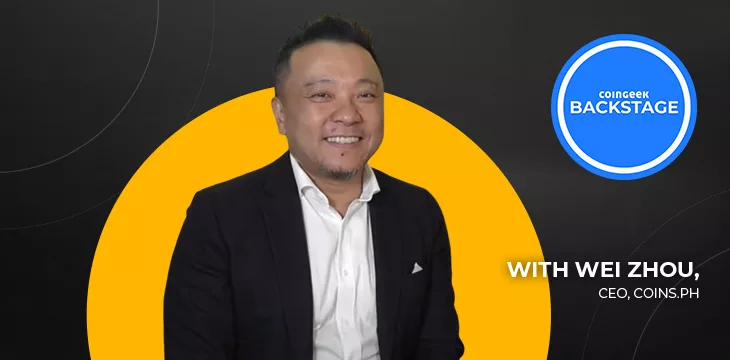|
Getting your Trinity Audio player ready...
|
Stablecoins are gaining popularity around the world. In the Philippines, the digital currency asset backed by real-world fiat like the U.S. dollar was seen as key to making cross-border payments and remittances more accessible and affordable.
At the recent Philippine Blockchain Week 2023, Coins.ph Wei Zhou sees stablecoins as one of the greatest trends in the financial spectrum. Zhou caught up with CoinGeek Backstage’s Claire Celdran to talk more about the recent blockchain trends and developments in the country and also to share his takes on how Coins.ph makes owning stablecoins a lot easier.
Zhou sees that the overall digital currency usage, particularly Web3 gaming, is lower and “has been on a downward trend.”
“There has been a lot more interest in stablecoins. Both in terms of U.S. dollars stablecoins as well as potentially peso stablecoins,” he told CoinGeek Backstage. He added that over the years, another positive trend in the blockchain space has been the popularization of NFT trading.
Coins.ph—a virtual asset service provider (VASP)/digital wallet offering established digital currency brands—onboarded Circle to promote USDC, a privately issued U.S. Dollar stablecoin, in the country.
“Anyone basically anywhere in the world can then send USDC to anyone here in the Philippines into the Coins.ph wallet. And then with Coins.ph, you can actually off board or convert your USDC into pesos into your Coins.ph wallet. And then you can spend it in your Coins.ph wallet, or you can send it to your bank account or send it to any other wallets like GCash or Maya,” the firm’s CEO explained.
“It’s already available now, but we want to sort of make a big push around it…We intend to work with a lot of the pawnshops here to basically make USDC as an available currency for them to use as well,” Zhou added.
Navigating the conversation into the regulatory hazards shaping the digital currency space in the Philippines, Zhou sees the challenge still lies with the activities of unregulated players who are promoting their activities in the country.
“I think it’s a gradual process in terms of educating users [to teach them who they are] sending money into. And if you do send money into a place where there’s not really anybody or anyone or any regulator that you can interact with. You know, there is a risk, as we’ve seen with FTX last year,” he said.
Although the Coins.Ph CEO is optimistic that this mentality has been gradually changing, although he still reminded everyone to protect their hard-earned money. In terms of further blockchain education, Zhou encourages beginners and players in the local blockchain space to visit Coins Academy on their website to learn about the fundamentals of digital currency.
“Another thing that we’re doing [and] what I find is that by bringing internationally recognized blockchains [and] by supporting them, we’re also hoping to bring them and the people that build on those blockchains to come and talk here [in the Philippines]—creating online seminars and AMAs to help people learn about things,” he noted.
Coins.Ph is fully regulated by the Bangko Sentral ng Pilipinas (BSP), with more than 16 million users nationwide and is the first digital currency based in Asia to secure a Virtual Currency and an Electronic Money Issuer license from a central bank.
To learn more about the happenings on the second Philippine Blockchain Week 2023, visit our recap stories here.
Watch: Philippines leads the way in blockchain adoption—here’s how

 08-15-2025
08-15-2025 





